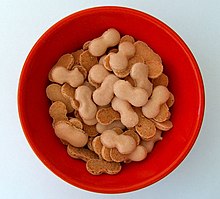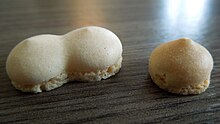Wibele
Wibele are a sweet biscuit made from biscuit dough originally from the town of Langenburg in Hohenlohe .
The dough made from egg white, powdered sugar, flour and vanilla sugar is reminiscent of Russian bread , but is only baked light brown. The biscuits are shaped like the sole of a shoe, but are very small at just 22 millimeters in length and 12 millimeters in width.
The Wibele was baked for the first time in 1763 as a patience tent by Jakob Christian Carl Wibel, court confectioner at the Prince of Hohenlohe-Langenburg in Langenburg . He allegedly gave the pastry its name because of the patience that had to be shown to make it. It was not until after 1800 that the biscuits were called Wibele after their manufacturer. According to other sources, the name originated during Jakob Wibel's lifetime, when Prince Karl zu Hohenlohe-Langenburg, out of anger about the poor quality of other suppliers, demanded that the products only be supplied “from Wibele”.

